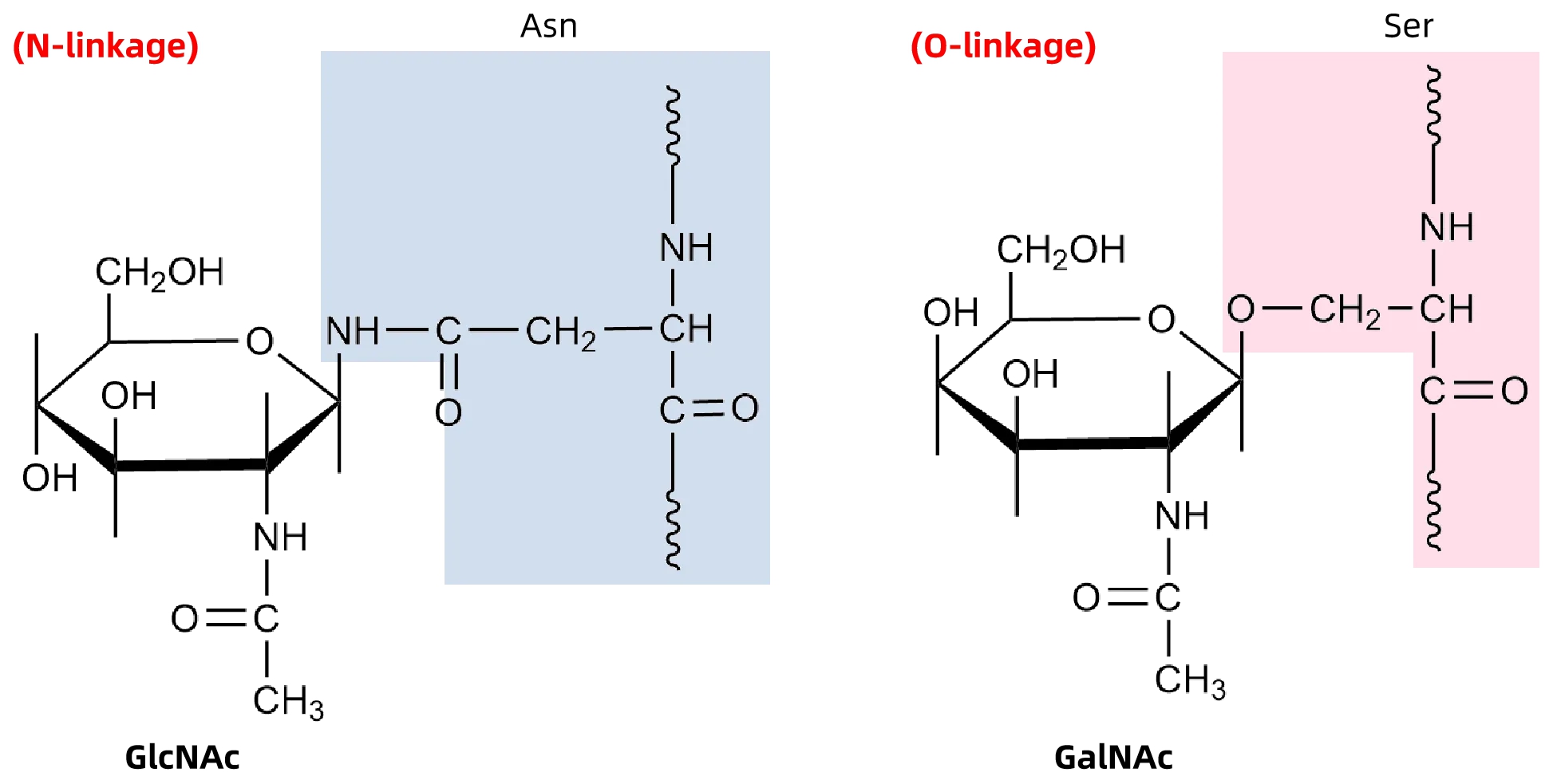Protein Glycosylation Analysis Service
Protein glycosylation is one of the most prevalent and intricate post-translational modifications (PTMs), playing a critical role in essential biological processes such as cell signaling, immune regulation, and cellular recognition. Additionally, protein glycosylation influences protein folding, stability, and activity and is closely linked to diseases including cancer, diabetes, and neurodegenerative disorders. Therefore, precise analysis of glycosylation sites, glycan structures, and their biological functions is essential for uncovering disease mechanisms, identifying therapeutic targets, and advancing biomarker discovery.
Protein glycosylation can be broadly categorized into N-glycosylation and O-glycosylation, based on the attachment mode between glycans and amino acid residues. N-glycosylation involves the covalent attachment of glycans to asparagine (Asn, N) residues, commonly found in secreted and membrane proteins, where it contributes to protein folding and structural stability. In contrast, O-glycosylation attaches glycans to the hydroxyl groups of serine (Ser, S) or threonine (Thr, T) residues, playing key roles in extracellular matrix formation and cell signaling.

Figure 1. Two Major Types of Protein Glycosylation
MtoZ Biolabs provides comprehensive Protein Glycosylation Analysis Service utilizing state-of-the-art mass spectrometry platforms, including Thermo Fisher Q Exactive HF, Orbitrap Fusion Lumos, and the Nano-LC system. Our end-to-end solutions span sample extraction, glycopeptide enrichment, high-resolution mass spectrometry analysis, and advanced bioinformatics interpretation, enabling researchers to elucidate the intricate mechanisms underlying glycosylation modifications and drive their scientific projects forward efficiently.
Technical Principles
Protein Glycosylation Analysis Service primarily leverages high-resolution mass spectrometry (MS) combined with liquid chromatography-tandem mass spectrometry (LC-MS/MS) to enable qualitative and quantitative glycopeptide analysis.
MtoZ Biolabs employs the Orbitrap Fusion Lumos mass spectrometer, utilizing dual fragmentation modes: high-energy collision dissociation (HCD) and electron transfer dissociation (ETD). HCD fragmentation facilitates glycan composition analysis, while ETD preserves peptide backbone integrity, allowing precise localization of glycosylation sites. This dual-fragmentation strategy overcomes the limitations of single-fragmentation approaches in complex glycopeptide analysis, ensuring robust and high-accuracy glycosylation site characterization.
During glycopeptide analysis, common glycans such as N-acetylglucosamine (203 Da), mannose (162 Da), and sialic acid (291 Da) induce characteristic mass shifts. By integrating mass spectrometry data with the Byonic bioinformatics platform, we achieve accurate identification of glycosylation sites, glycan structures, and glycopeptide compositions, ensuring a comprehensive and reliable protein glycosylation analysis pipeline.
Analysis Workflow
Our Protein Glycosylation Analysis Service follows a rigorously standardized workflow, ensuring precision and reproducibility across every stage, from sample preparation to data interpretation:
1. Protein Extraction and Enzymatic Digestion: Proteins are extracted and enzymatically digested into glycopeptides.
2. Glycopeptide Enrichment: Target glycopeptides are enriched using specific glycan-affinity materials.
3. Mass Spectrometry Analysis: Glycopeptides are analyzed via Nano-LC-MS/MS for high-resolution data acquisition.
4. Data Analysis: Specialized bioinformatics tools are employed to identify glycosylation sites, analyze glycan structures, and quantify glycopeptide abundance.

Why Choose MtoZ Biolabs?
1. Advanced Analysis Platform
MtoZ Biolabs established an advanced protein glycosylation analysis platform, guaranteeing reliable, fast, and highly accurate analysis service.
2. High-Data-Quality
Deep data coverage with strict data quality control. AI-powered bioinformatics platform integrate all protein glycosylation analysis data, providing clients with a comprehensive data report.
3. Multi-Sample Compatibility
Our platform supports a wide variety of biological samples, including cells, tissues, blood, and bodily fluids, providing flexibility to accommodate diverse research demands.
4. Expert Scientific Team
Our team of experienced researchers and mass spectrometry specialists provides tailored experimental designs and expert technical support to meet diverse research requirements.
5. One-Time-Charge
Our pricing is transparent, no hidden fees or additional costs.
What Could be Included in the Report?
1. Comprehensive Experimental Details
2. Materials, Instruments, and Methods
3. Total Ion Chromatogram & Quality Control Assessment
4. Data Analysis, Preprocessing, and Estimation
5. Bioinformatics Analysis
6. Raw Data Files
FAQ
Q1: What are the sample requirements for protein glycosylation analysis service?
To ensure high-quality results, we recommend submitting high-purity samples such as tissues, serum, plasma, or cell lysates. Samples should contain no less than 1 mg of total protein and be stored at -80°C to prevent degradation caused by freeze-thaw cycles. Additionally, protease and glycosidase activity must be minimized to preserve glycosylation integrity.
Q2: How are low-abundance glycosylated proteins or peptides enriched and detected?
We employ highly efficient enrichment strategies, including lectin affinity chromatography, glycan-specific antibody enrichment, and hydrophilic interaction chromatography (HILIC). Combined with the sensitivity of the Orbitrap Fusion Lumos platform and HCD/ETD dual fragmentation modes, these strategies ensure reliable detection and quantification of low-abundance glycopeptides.
Protein Glycosylation Analysis Service supports biomarker discovery, drug target validation, protein function research, and vaccine development. Leveraging cutting-edge mass spectrometry platforms and advanced bioinformatics tools, MtoZ Biolabs delivers precise, reliable insights to accelerate scientific discoveries and drive innovations in life sciences.
For more details, feel free to contact us for a free consultation!
How to order?







